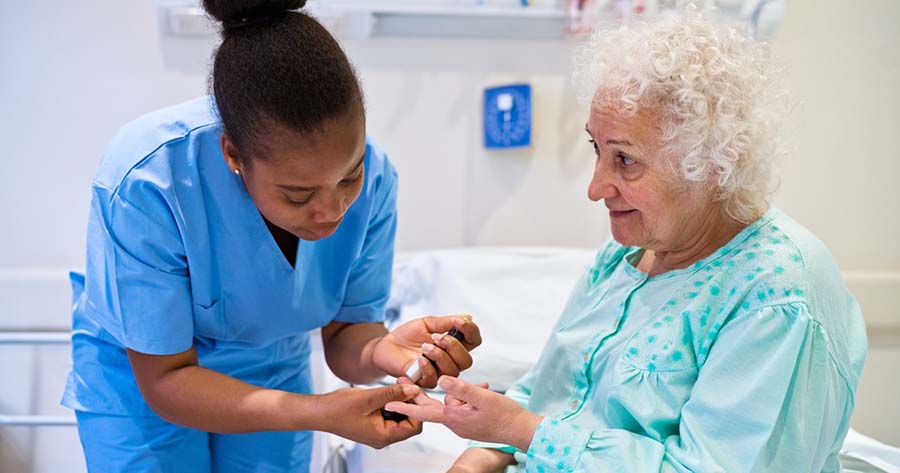Over recent months there has been lots of publicity about the increasing number of people in care settings with diabetes, now at an all time high. There is concern about the particular set of difficulties faced by this group of people, as well as the difficulties for those providing their care.
These problems arise because care services, through no fault of their own, are underfunded. They generally have a high turnover of staff and access to the training necessary to manage diabetes in a care setting is poor. The result of this is that if someone has either low or high blood glucose levels, then very often the first reaction of a carer is to call 999, resulting in an unnecessary hospital admission – an admission that could have been avoided had some simple steps been followed. Even those people with diabetes within a hospital setting face an increased risk of problems, such as potentially fatal medication errors (Fox et al, 2013).
A solution
As a solution to this growing problem, the InDependent Diabetes Trust (IDDT) has been working closely with the Institute of Diabetes for Older People (IDOP) and the English Community Care Association (ECCA) to produce a “Passport for diabetes in care settings.” The passport draws together the essential elements of a person’s diabetes care needs into one simple, user-friendly document. Nursing and care staff can use the passport to familiarise themselves with those needs quickly and easily, and the passport should provide them with clear instructions as to what to do should problems arise.
The development of the passport was led by myself. Prior to working for IDDT, I had spent several years as a registered care home manager, working with adults with learning disabilities and complex needs. It was in this role that I was introduced to the concept of the “passport”. Soon after coming to work for IDDT, I noticed the similarity of the difficulties faced by these people with diabetes in both hospital and care settings, and it was decided that passports should be developed. The “Hospital Passport” was developed in 2011 for people with diabetes who have a pre-planned admission to hospital. This proved a major success and, to date, IDDT has sent out over 65 000 copies.
A passport for diabetes in a care setting
It was then decided to extend the concept to develop a passport for diabetes for use in a variety of care settings. The Passport was launched in May this year and is appropriate for people with both type 1 and type 2 diabetes. The passport provides carers with the following information:
- Basic personal information, such as name, address and age
- Contact details of relevant healthcare professionals
- Information about the type of diabetes the person has and how it is managed.
- Specific details about how the individual manages their diabetes, for example, the person can state that they would prefer to store and administer their medication themselves. They can also indicate that they would like to monitor their own blood glucose. If they require assistance with this, they can state this in the passport.
- Clear instructions on what to do if problems occur.
- Information on the individual’s hypoglycaemia indicators.
- Details of other health problems where there is increased risk.
IDDT Chair, Jenny Hirst, has said:
“The Passport is designed to provide a greater understanding of the needs of people with diabetes and will benefit both care providers and those with diabetes.”
Aims of the passport
Specifically, the aims of this passport is to:
- Reduce unnecessary hospital admissions.
- To enable care home staff to meet the needs of the people with diabetes in their care better.
- To improve the quality of life and care for the person with diabetes.
Martin Green OBE, the English Community Care Association’s CEO said:
“Our Passport is an extremely practical booklet. It will help staff in community and acute health services to really understand the person with diabetes and help them to deliver appropriate care and support.”
Positive response
There are currently no plans to formally evaluate the passport for care settings, although so far feedback from healthcare professionals and people living with diabetes has been positive. Requests for copies of the passport continue to come in and we are pleased to say that we have sent out over 16 000 copies to GPs, DSNs, community nurses and clinical commissioning groups, as well as people living with diabetes.
Get your copy
Free copies of both passports are available by contacting the Independent Diabetes Trust.
Email: [email protected]
Telephone: 01604 622837





Key scientific developments presented at the conference.
6 Aug 2025